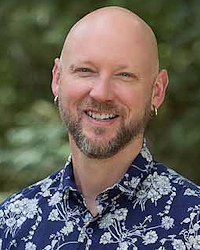
Mr Robin Wilkinson
Relationship Therapist, Psychotherapist
Right Relationship
Fitzroy North, Melbourne VIC 3065
In Person + Online Therapy Australia-wide
Philosophy & Vision
We are born to connect but that doesn't mean we can't sometimes use support in our relationships. Relationships are both an art and a science. I approach relationship therapy from both perspectives, helping you understand the neuroscience of relating through your own nervous system and supporting you with practical tools to help turn your relationship into a work of art! I want to help you have the safe, lasting, passionate relationship you desire.
Background
I have been a psychotherapist since 2015 and worked in the field of personal health since 2003, when I began work as a shiatsu therapist. I have held employment in senior management for the Australian Public Service, volunteered for several different organisations, and currently sit on the committees for two men's wellbeing charities. I have extensive training in neuroscience, attachment and relationship and family therapy all of which I bring into my sessions. I have a Masters in Family Therapy and have trained extensively in the Psychobiological Approach to Couple's Therapy.
Services
I use evidence-based approaches to support relating and relationships for individuals and couples. I work deeply with attachment and nervous system regulation and have an emphasis on trust and safety (internally and within relationships). I help people learn how to 'regulate' and 'co-regulate', manage triggers and emotional overwhelm and integrate past experiences. I help couples develop skills to manage conflict and repair relational ruptures. My aim is to help build your skills and capacity to effectively relate.
I also work with couples (and more) in non-traditional formations such as ethically non-monogamous or polyamorous and understand the unique challenges they present, which other relationship therapists may not be aware of.
Quality Provision
I hold registration with ACA, AAFT and I attend regular supervision with supervisors and mentors. My work is governed by a professional code of ethics. I am firmly committed to ongoing professional and personal development.
Areas of Special Interest
Accreditations
- Adv. Dip. Transpersonal Counselling - 2015 - Phoenix Institute Australia
- Grad Dip Family and Systemic Therapy - 2021 - Australian Catholic University
- Diploma Shiatsu & Oriental Therapies - 2012 - Australian Shiatsu College
Modalities
Attachment Theory - Dream Work - Emotional Release - Emotionally Focused Therapy - Existential - Experiential - Focusing - Gottman Method - Holistic - Inner Child - Internal Family Systems - Interpersonal - Marriage and Family - Meditation - Mindfulness - Narrative Therapy - PACT - Person Centred - Sandplay Therapy - Transpersonal - Trauma-Informed
Therapy Approach
Clients have told me that they find my approach to be non-judgmental and collaborative.
You are the expert on your own life and know your own needs, wants and goals. My job is to walk alongside you and help you draw upon your own wisdom and to provide tools for you to use in your own life. I will endeavour to meet you where you are at and never tell you what to do, give advice or pass judgement.
My approach can be described as person-centred, humanistic, and trauma-informed.
Professional Associations
- Australian Association of Family Therapy
- Australian Counselling Association - Level 2
Practice Locations
842 Nicholson Street
Fitzroy North VIC 3065
There is free parking in the side streets off Nicholson Street. By public transport, from the CBD, take the number 96 tram and get off at stop 19.
8-10 Mansfield St
Thornbury VIC 3071
Appointments
My hours are 10:00 am to 7:30 pm Tuesday to Friday and 8:00 am to 6pm on Fridays.
Fees & Insurance
Hourly Rates
* Individual - AUD $150
* Couple / Family - AUD $180
Payment Options
EFTPOS, Credit Card, Online Payments including Paypal and direct deposit.
First session requires payment upfront with a 48-hour cancellation window.
Contact Robin
Please contact me to book a 15 minute free initial consult

